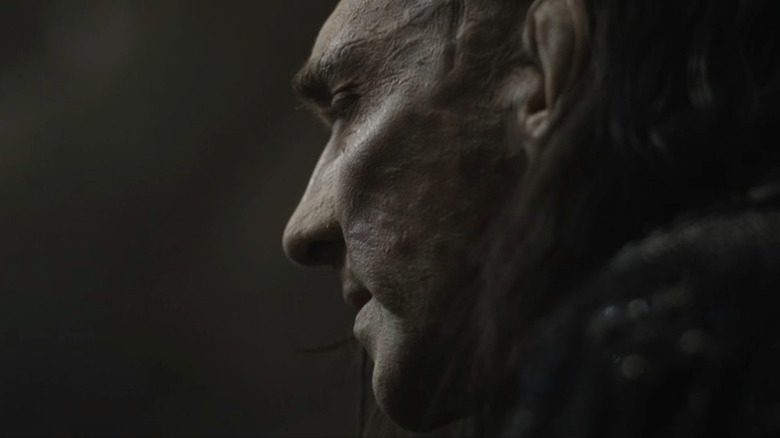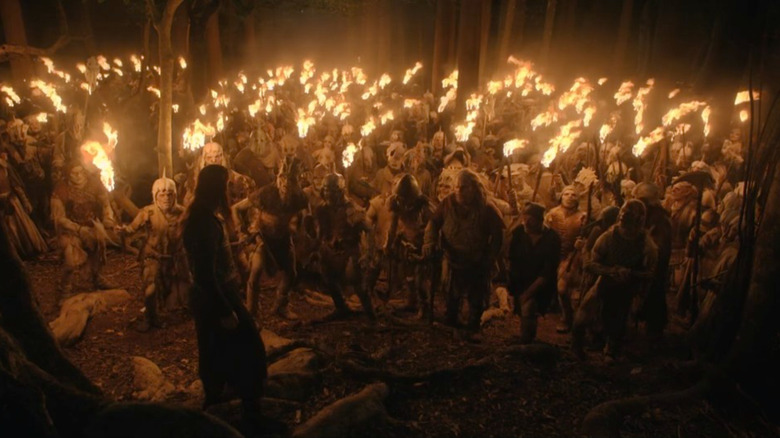Rings Of Power's Complicated Take On Sauron Is Firmly Rooted In Tolkien's Lore
"The Lord of the Rings: The Rings of Power" has taken a lot of liberties with its Middle-earth storytelling. It's an activity that's normal with any adaptation, especially one where the source material is so thin. Even so, there have been points where the creative decision-making has raised some eyebrows.
The need to build a tower (by spring, no less) to heat up a bunch of mithril to save the Elves is the most obvious one that comes to mind, but there are others. Compressing the show's timeline is another major change, even if it makes a lot of sense (Tolkien's story stretches across 3,500 years, which presents some continuity issues with mortal characters). Even the little details, such as daily life in places like Lindon and Khazad-dûm, have been invented en masse to make these places look real and alive for the show. And yet, the reason for their existence doesn't change the fact that they're made up for Prime Video's version of the story.
In Episode 6, "Udûn," we get a bit of backstory about Sauron from the Dark Lord's erstwhile follower Adar. The twisted Elf paints a picture of a surprisingly impressive Sauron who actually tried to heal a broken and hurt Middle-earth — or at least, that's what we hear. At first glance, this seems like another moment where the writers are filling in substantial parts of the story, and many of the details are certainly added in as flourishes. But there's actually a surprising amount of Sauron's softer backstory in "The Rings of Power" that finds its basis right in Tolkien's original writings.
Adar's backstory for Sauron
Galadriel spends several minutes of Episode 6 interrogating Adar after she and Halbrand capture the Orc leader in the woods. After a surprisingly violent threat to bring Adar's surviving Orcs into the sunlight if he won't talk, Adar finally spills the beans, starting with the surprising line, "After Morgoth's defeat, the one you call Sauron devoted himself to healing Middle-earth, bringing these ruined lands together in perfect order."
The fallen Elf goes on to describe a Dark Lord who was clearly willing to go to any length to accomplish his goals. He talks about Sauron turning to the unseen world for answers and leading a host of his followers north, where things got really dark when he spilled a lot of blood (including many of Adar's own servants) in the pursuit of this morbid, twisted form of supernatural healing. The experience is so awful, that Adar claims he eventually killed Sauron — something that everyone knows is impossible, since, you know, Sauron's still kicking around during "The Lord of the Rings," thousands of years later.
Of course, Adar may have destroyed his corporeal form without realizing that Sauron (who is a spirit by nature) could just take another physical form later on, or something along those lines. But the real question here isn't whether Sauron is temporarily disembodied or not. For goodness' sake, he's not even physically in the story yet. The inquiry worth asking is whether the villain really was a not-so-Dark Lord at one point in the story — and the answer is a surprising "yes."
Tolkien's take on a positive Sauron
Tolkien makes several direct mentions of a more positive Sauron at different points in his writings. The most obvious one for casual fans is in the book version of the Council of Elrond, when the titular Elf warns against using the One Ring, saying, "For nothing is evil in the beginning. Even Sauron was not so." Of course, this reference goes all the way back to the character's genesis, when he's a pure spirit that is yet to be corrupted by his original master, the Dark Lord Morgoth.
The warm, fuzzy feelings don't stop there, though. "The Silmarillion" talks about a much later time when Sauron actually turns away from a life of evil. At the end of the First Age, when Morgoth is overthrown (and not long before "The Rings of Power" story), Sauron is given a chance to repent and face judgment for his crimes. When this happens, Sauron puts on a show of repenting for his evil deeds. The text even clarifies that, "Some hold that this was not at first falsely done, but that Sauron in truth repented, if only out of fear, being dismayed by the fall of Morgoth and the great wrath of the Lords of the West." To be fair, this initial phase of repentance is short-lived. Sauron is too ashamed to go on trial and face the consequences for his past crimes, and he runs off to hide in an undisclosed location in Middle-earth. But it still reiterates the fact that even Sauron himself has that glimmer of redemptive hope in him.
Sauron ...the reformer?
Finally, we have a letter Tolkien wrote to a fan in 1954, where he states, "Sauron was of course not 'evil' in origin. He was a 'spirit' corrupted by the Prime Dark Lord (the Prime sub-creative Rebel) Morgoth." The author goes on to echo "The Silmarillion" text regarding Sauron's short-lived, shame-filled attempt at repentance, adding, "But at the beginning of the Second Age he was still beautiful to look at, or could still assume a beautiful visible shape — and was not indeed wholly evil, not unless all 'reformers' who want to hurry up with 'reconstruction' and 'reorganization' are wholly evil, even before pride and the lust to exert their will eat them up."
This take on Sauron is fascinating. Tolkien expands on the idea of his semi-authentic repentance, adding that the character isn't fully evil even as he starts the process that ends with his becoming the Dark Lord and the primary villain for such a lengthy period of Middle-earth history. He compares him to reformers and reconstructionists who start with good intentions before sliding into evil over time. Seen from the perspective of a disgruntled follower like Adar, it's not a stretch to assume that the Elf would see Sauron as someone who is devoted to healing and bringing order to a hurt world, albeit through some admittedly sinister solutions.
Sauron, the Abhorred
Despite all of the potential for good here, at the end of the day, we can't lose sight of the fact that Sauron is still the future Dark Lord that threatens the world with conquest and evil during "The Lord of the Rings." Early glimmers of redemptive hope and goodness aside, he's still public enemy number one. He's the worst of the worst.
Even in his introduction, "The Silmarillion" makes this clear, saying "In all the deeds of Melkor the Morgoth upon Arda, in his vast works and in the deceits of his cunning, Sauron had a part, and was only less evil than his master in that for long he served another and not himself." The description ends with the damning line, "But in after years he rose like a shadow of Morgoth and a ghost of his malice, and walked behind him on the same ruinous path down into the Void."
We may be hearing about a semi-redemptive version of the future Dark Lord in "The Rings of Power," but let's not forget that even by this early point in the story, Sauron already has a track record that leads the Elves to name him Gorthaur, which translates from the Elvish as "The Abhorred." Yeah. This guy's bad news, no matter what way you slice it. The lingering question is, where in Middle-earth is he?




